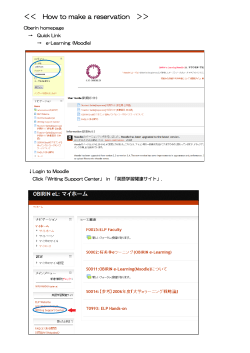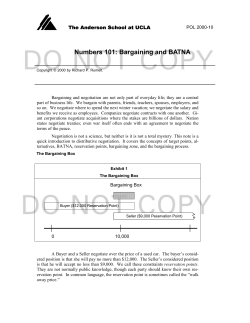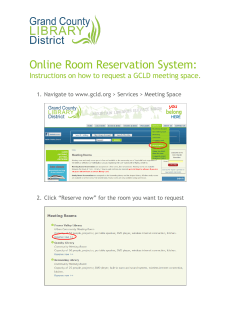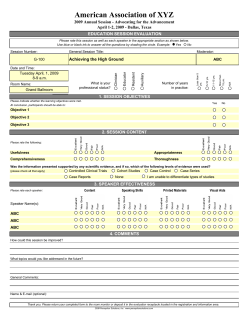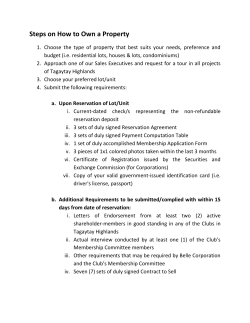
Psych 253 Judgments and Decisions Negotiations Negotiations and Conflict Resolution
Negotiations and Conflict Resolution Psych 253 Judgments and Decisions Negotiations Barbara Mellers Texoil An independent service station in the Port of Los Angeles is for sale by owners (married couple) Texoil, a large petroleum refining company, is a potential buyer (Texoil representative) Parties have 5 minutes to prepare and 30 minutes to negotiate and discuss Texoil’s possible purchase of the service station When you prepare, think about your BATNA, your reservation price, and your underlying INTERESTS! Each Side’s Information Texoil Rep. BATNA Reservation Price Interests Station Owner Each Side’s Information Texoil Rep. BATNA Reservation Price Interests $675,000 (Build one) Station Owner $400,000 (BP offer) Each Side’s Information Texoil Rep. BATNA $675,000 (Build one) Reservation Price $500,000 Why not $675K? Minimart = $100K Upgrades = $?? Interests Station Owner $400,000 (BP offer) $553,000 ($488,000 after taxes) Boat loan: $230,000 Boat ready: $68,000 Food, health, clothing: $75,000 Boat repairs: $40,000 Savings after return: $75,000 Each Side’s Information Texoil Rep. BATNA $675,000 (Build one) Reservation Price $500,000 Why not $675K? Minimart = $100K Upgrades = $?? Interests Good price Good managers Station Ownership Station Owner $400,000 (BP offer) $553,000 ($488,000 after taxes) Boat loan: $230,000 Boat ready: $68,000 Food, health, clothing: $75,000 Boat repairs: $40,000 Savings after return: $75,000 Time off (2 years) Spouse’s health Sail around the world Savings / future income Health insurance, food, etc. Who reached an agreement? What kind of information did you share? What was the key to an agreement? Initial Texoil Situation Station Owner’s Reservation Price ($553,000) Texoil Rep’s Reservation Price ($500,000) 400 450 BATNA For Station Owner (or, stay put) 500 550 Sale Price (in thousands) 600 650 700 700 BATNA For Texoil Rep Revised Texoil Situation: If Texoil Representative includes Job Offer Upon Return Station Owner’s Reservation Price ($467,000) Texoil Rep’s Reservation Price ($500,000) 460 470 480 490 500 510 Sale Price (in thousands) 520 530 Characteristics of Integrative Bargaining Multiple issues Differing preferences, expectations, risk attitudes Differing interests Future relationship Multiple alternatives Distributive Bargaining Integrative Bargaining One issue Win-Lose Many issues Win-Win Outcome Process and outcome Max share of pie Max size and share of pie One time Repeated times One position Many options Keep interests hidden Share interests Keep information hidden Share information Competitive Cooperative/Competitive Position-based Interest-based TACTICS Distributive Bargaining Integrative Bargaining Define your BATNA Analyze own & other’s interests Define your reservation price Analyze own & other’s priorities Define your target level Prepare multi-issue proposals Prepare objective rationales Think creatively about shared interests Open high Cooperate Anchor with first offer Build trust Discuss single issue Make package deals Make bi-lateral, not unilateral concessions Make multiple offers simultaneously Persuade through objective rationale Ask for and share info about interests & priorities Why did impasses occur? Negotiators may have: Escalated commitment to positions Tried to win over all else Believed that the pie was fixed (other party’s interests are opposite yours) Had positive illusions and unrealistic aspirations Had negative views of opponent Integrative Negotiation Separate people from problem Should you be a hard or soft negotiator? Focus on interests, not positions Generate multiple possibilities Base results on objective standards Advantages of Integrative Agreements Improve outcomes Create more stable agreements Improve implementation Strengthen the relationship But.. The non-separability of integrative and distributive negotiations Tactics that claim value can impede its creation “Value that has been created must be claimed” Persuading, withholding information Approaches to creating value are vulnerable to claiming tactics Disclosing interests, priorities The Prisoner’s Dilemma Your Partner Not confess Confess 2 yrs 0 yrs Not confess 2 yrs You 10 yrs 10 yrs 5 yrs Confess 0 yrs 5 yrs The Negotiator's Dilemma Your Counterpart Create Claim Good Great Create Good You Terrible Terrible Mediocre Claim Great Mediocre Resolving the Dilemma Prepare for integrative and distributive opportunities Analyze own & other’s interests; avoid fixed-pie perception Know your BATNA, Res Price, objective arguments Balance cooperation and competition Build trust: don’t jump in trusting immediately, but be open to a trusting interaction Ask for and share info about interests & priorities, but watch out for unilateral information exchange
© Copyright 2025
